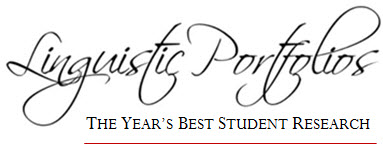
Abstract
As science evolves, there is an ever-increasing interplay between disciplines. In Communication Sciences and Disorders interdisciplinary theory is needed because of a number of factors such as the growing detail in imaging technology, the development of new strategies in the identification and the treatment of disease, and the nuances that arise in fields that have become more and more specialized. Linguistics and the Communication Sciences and Disorders are a perfect example of disciplinary complementarity. This paper is the written version of an invited plenary speech given in 2016 at the Minnesota Undergraduate Linguistics Symposium. The theme of the symposium was Linguistic Applications, namely how linguistics complements and influences other fields. The specific angle taken in this paper is the complementarity between Linguistics, Neurolinguistics, and Communication Sciences and Disorders. Speech Language Pathologists receive patients with diagnoses affecting their ability to use language to communicate effectively. On the basis of the diagnosis, they determine the linguistic symptoms and a course of action. In my clinic, not only does the Speech Language Pathologist use an interdisciplinary approach, but a transdisciplinary model of care is used, as will be explained later in the paper.
Creative Commons License

This work is licensed under a Creative Commons Attribution-NonCommercial 4.0 International License
Faculty Supervisor
Ettien Koffi
Recommended Citation
Yoder-Black, Deanna
(2017)
"The Complementarity between Theoretical Linguistics, Neurolinguistics, and Communication Sciences and Disorders,"
Linguistic Portfolios: Vol. 6, Article 2.
Available at:
https://repository.stcloudstate.edu/stcloud_ling/vol6/iss1/2



Author Bio
Deanna Yoder-Black is a graduate (BA 2002 Linguistics, BS 2004 Communication Science and Disorders) of St. Cloud State University. She went on to earn her Master’s of Science in Speech Language Pathology from Boston University (2006). She has the unique position, then, to utilize her linguistics foundation in the treatment of her patients. Deanna’s patients primarily see her for neurological communication and cognition disorders resulting from a variety of neurological insults (e.g. stroke, brain injury, progressive disorders, congenital disorders). Deanna is passionate about the field of Neurolinguistics and strives to utilize this exciting sub-field of Theoretical Linguistics in order to improve patient outcomes as her patients aspire to return to home, work, and life. Deanna has traveled the United States gaining a wide variety of experience while working in IL, NC, GA, TX, MN, VA, and AK. She currently works and resides in the great state of Alaska. Her plenary talk highlighted the complementarity between Theoretical Linguistics, Neurolinguistics, and Communication Sciences and Disorders.